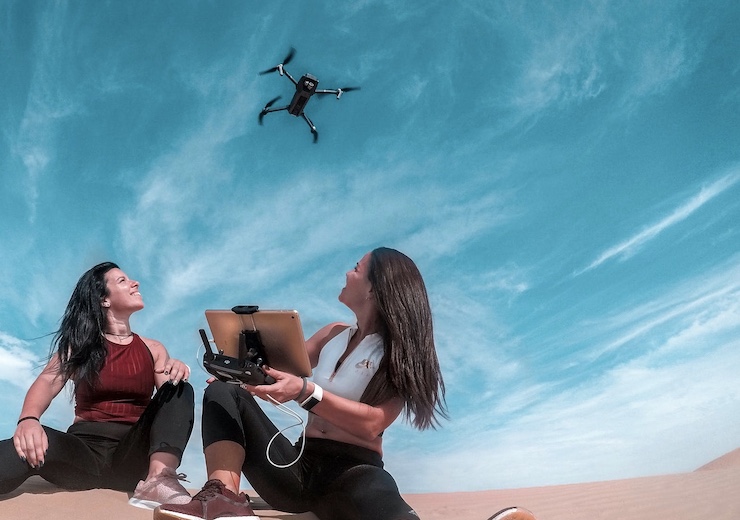
On an average day, there could be over 100,000 manned aircraft flying across the United States. Organizing these flights is a massive undertaking for air traffic controllers, but they have one major factor helping ensure the safety of these flights. All of these aircraft have at least one pilot on board communicating with traffic controllers on the ground, in control of the aircraft’s computers, and visually aware of their surroundings. It is a complex system, one that took many years to perfect. With the growing popularity of unmanned aircraft, drones, a new level of air traffic control concerns has arisen. As of February 2021, the Federal Aviation Administration (FAA) has registered 380,557 commercial drones and 491,237 recreational drones with more than 212,000 Part 107 certified pilots. Those numbers are expected to keep growing.
One of the FAA’s primary objectives is to find ways to safely integrate the massive influx of drones into shared airspace. One way to achieve this is by establishing companies dedicated to air traffic control specifically for drones. SkyGrid hopes to fill this niche by becoming “the world’s most trusted airspace management system that integrates all unmanned aircraft in the global airspace,” as stated on their website. To become the most reliable drone air traffic control system, SkyGrid has combined forces with aviation pioneer Boeing and Artificial Intelligence expert SparkCognition. Uncomplicating the complex environment of low altitude airspace for drone flight is powered through the use of blockchain technology integrated with AI software.
One worry about drone integration in shared airspace is the ability to keep them safe from zero-day attacks. As drones are operated through computer software with no onboard pilots, they are vulnerable to hackers taking control of the systems. As the founder and CEO of both SkyGrid and SparkCognition, Amir Husain said “In the near future, we’ll essentially have a network of flying computers in the sky, and just like the computers we use today, drones can be hacked if not secured properly. In this emerging environment, traditional anti-malware technology won’t be adequate to detect these never-before-seen attacks. SkyGrid is taking a new, intelligent approach by using AI to more accurately detect and prevent cyber attacks from impacting a drone, a payload, or a ground station.”
One step in protecting from hacker interference is SkyGrid’s use of a blockchain to plan and execute flight plans. Each block of information in a blockchain is protected by transaction data, a timestamp, and a cryptographic hash of the previous block. If someone were to try and alter any aspect of the chain it would instantly become public and blocked. The blockchain allows drone operators to create a flight plan that is secure and efficient. Keeping drone flights further protected, Amir recently announced the implementation of SparkCognintion’s AI software called DeepArmor.
DeepArmor can be directly implemented into any drone’s hardware system, even a drone with minimal processing systems. Since DeepArmor is directly installed into the drone rather than being wirelessly transmitted, it protects the drone from malicious intent even if there is no wireless connectivity available. DeepArmor is an in depth AI learning machine that can detect 99.9% of any threats, even ones not previously programmed into the system. DeepArmor learns characteristics of threats to be the ultimate endpoint against zero-day attacks, the moment when a drone’s computer could be vulnerable.
To test DeepArmor’s capabilities, SkyGrid planned a flight using their blockchain supported flight model. Then they simulated a cyber attack by establishing a remote connection to the drone. The hacker tried to take over control of the drone, whereupon the DeepArmor recognized the unwanted interference. DeepArmor autonomously intercepted the attack, encrypted control, and rerouted the drone to land in a secure location to be processed safely before being able to resume flight. “This is especially important in the UAV industry where we expect to see never-before-seen cyber attacks emerge as more drones take flight,” Amir said. DeepArmor worked to protect small recreational type drones and larger ones that will be used for deliveries and eventually as unmanned human transportation vehicles.
With advanced AI systems like DeepArmor and flight plans executed through blockchain technology, the integration of drones in shared airspace can become a reality. “We imagine a universe where you have hundreds of thousands, potentially millions of drones, all being managed with the SkyGrid platform,” said Sridhar Sudarsan, SparkCognition’s CTO. “Managed within specific missions, by region, by enterprise, fully protected with the DeepArmor Product.” This system opens up the possibility for drones to be managed in the air just how manned aircraft are, through dedicated air traffic control management.
|